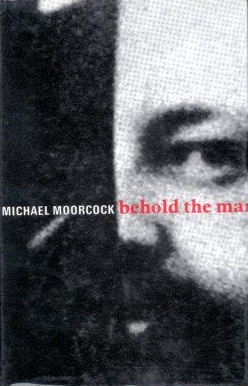 Dust-jacket from the hardback first edition. | |
| Author | Michael Moorcock |
|---|---|
| Cover artist | Gabi Nasemann |
| Language | English |
| Series | Karl Glogauer |
| Genre | Science fiction Existentialism |
| Publisher | Allison & Busby |
Publication date | 1969 |
| Publication place | United Kingdom |
| Media type | Print (hardback & paperback) |
| Pages | 144 |
| Award | Nebula Award for Best Novella (1968) |
| ISBN | 0-85031-004-0 |
| OCLC | 47258 |
| 823/.9/14 | |
| LC Class | PZ4.M8185 Be PR6063.O59 |
| Followed by | Breakfast in the Ruins |
Behold the Man is a existentialist science fiction novel by British writer Michael Moorcock. It originally appeared as a novella in a 1966 issue of New Worlds magazine; later, Moorcock produced an expanded version that was first published in 1969 by Allison & Busby [1] (one of the first books published by the company). [2] The title derives from John 19, Verse 5, in the New Testament: "Then Jesus came out, wearing the crown of thorns and the purple robe. And Pilate said to them Behold the Man".
Contents
- Plot summary
- References in other Moorcock works
- Awards and nominations
- Selected editions
- Footnotes
- References
- External links
In the novel, Moorcock weaves an existentialist tale about Karl Glogauer, a man who travels from the year 1970 in a time machine to 28 AD, where he hopes to meet the historical Jesus of Nazareth. A sequel, Breakfast in the Ruins , was published in 1972.
